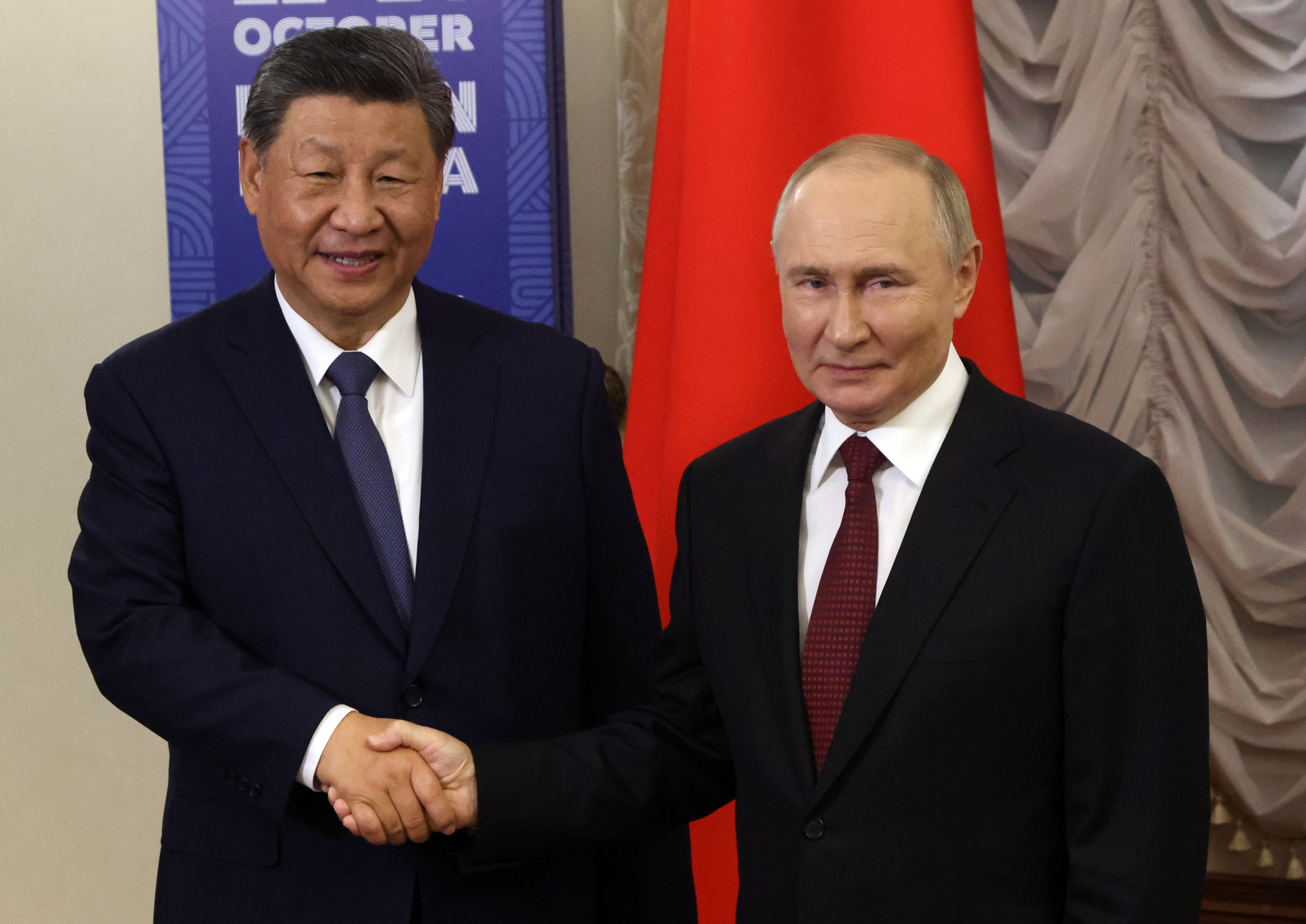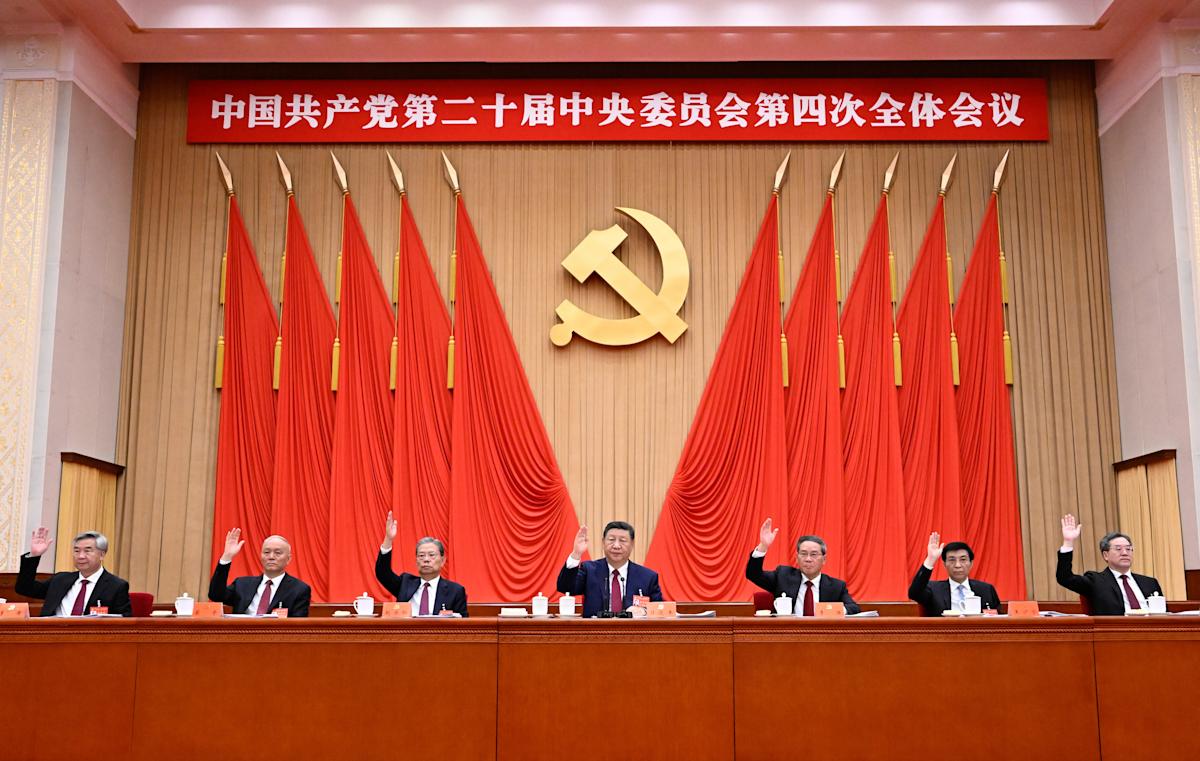More than eight in 10 Americans expressed concern about the increasing cooperation between China, Russia, Iran and North Korea, according to a new poll.
The survey, conducted early last month by the Washington, D.C.-based Ronald Reagan Institute, sought Americans’ attitudes toward foreign policy after a year of geopolitical turbulence and as the country prepares to transition to a new administration.
For the first time in its history, the annual poll included a question on coordination between China, Russia, North Korea and Iran, including on arms sales, joint military drills and economic partnerships.
Getty Images
An overwhelming 86 percent of Americans expressed concern about the deepening partnerships among these U.S. adversaries, with 49 percent saying they are “extremely concerned” and 37 percent “somewhat concerned.”
“With national security and foreign policy leaders in Washington talking more and more about the cooperation between malign actors, we wanted to know if everyday Americans shared that concern,” Rachel Hoff, policy director of the Ronald Reagan Institute, told Newsweek.
The poll revealed deep and enduring suspicions toward these nations.
Three-quarters of those surveyed view China as either a “strong enemy” or “something of an enemy,” a figure that has remained roughly the same over the past two years, but is up by 10 percentage points from November 2021 and 20 points from 2018.
Meanwhile, 80 percent of Americans perceive Russia as an enemy, also consistent with the last two years, but up 15 percentage points from November 2021.
Iran is viewed as an enemy by 76 percent of respondents, a figure that has remained relatively steady since 2019, when it stood at 82 percent.
China and Russia-Led Cooperation
Beijing-Moscow cooperation has deepened since the two proclaimed a “no-limits” partnership on the eve of Russian President Vladimir Putin‘s 2022 invasion of Ukraine in 2022.
Earlier this year, Russian Foreign Minister Sergei Lavrov and his Chinese counterpart, Wang Yi, criticized the U.S. and NATO’s “block-based approaches” and hinted at plans for a “new security architecture in Eurasia” to counter “Euro-Atlantic mechanisms,” which they said were self-destructing.
Though China has sought to present itself as neutral on the war against Ukraine, it has supported Russia’s economy through record increases in trade and purchases of discounted Russian oil, blunting the impact of international sanctions.
The U.S. and its allies have accused China of supplying Russia with dual-use goods that bolster its war capabilities. Recently, European Union officials have cited reports showing China has been producing drones for Russia’s military efforts, prompting the 27-member bloc to mull sanctions.
Iran has for some time been providing its Russian ally with Shahed-136 attack drones for deployment in war-torn Ukraine.
China, Russia and Iran, along with North Korea, have also conducted joint naval drills, reflecting their growing military coordination.
Meanwhile, China’s ally, North Korea, has continued to step up its collaboration with Russia. Pyongyang has shipped Russia thousands of containers that the U.S. and South Korea believe were filled with artillery shells and other munitions.
In a further escalation of the war, thousands of North Korean troops last month joined Russian forces in frontline areas like Kursk, where Ukraine has been carrying out a counteroffensive since August.
Views on Military Strength and Engagement
Americans also weighed in on the optimal size of the U.S. military for countering global threats.
Among the respondents, 41 percent believe the military should be large enough to fight and win separate wars against both China and Russia—a position consistent with the “two-war doctrine” that dominated U.S. strategy for decades after World War II.
Another 20 percent said the armed forces should be sufficient to win simultaneous conflicts against China and a smaller adversary, such as North Korea or Iran. Meanwhile, 12 percent support a military just large enough to defeat China, with 5 percent advocating for a force capable of fighting the country “to a draw.”
Another 12 percent believe the military should focus solely on defending U.S. borders.
Increasing Support for Global Leadership
The poll highlighted a growing desire among Americans for increased international engagement. The percentage of respondents who believe the U.S. should take the lead in world affairs rose 15 points to 57 percent compared to last year’s poll.
“[China-Russia-North Korea-Iran] collaboration threatens global stability, American interests, and the values of the free world,” Hoff said.
The survey was conducted by Beacon Research, a Democratic-affiliated polling firm, and Shaw & Company Research, a Republican-affiliated firm. It was carried out between November 8 and 14, sampling 2,510 U.S. adults.
Avril Haines, the outgoing director of national intelligence, warned of the risks posed by an “axis of authoritarians” seeking to “pre-position themselves” for the incoming Trump administration.”
Speaking at an event hosted by the Council on Foreign Relations think tank in Washington, D.C., she stressed that Russia, China, North Korea and Iran were not working together as a cohesive NATO-style bloc, Voice of America reported. “What we are seeing… is increased cooperation on a bilateral and sometimes trilateral level.”
Newsweek reached out to the Chinese, Iranian and Russian foreign ministries and the North Korean embassy in China by email with requests for comment.


